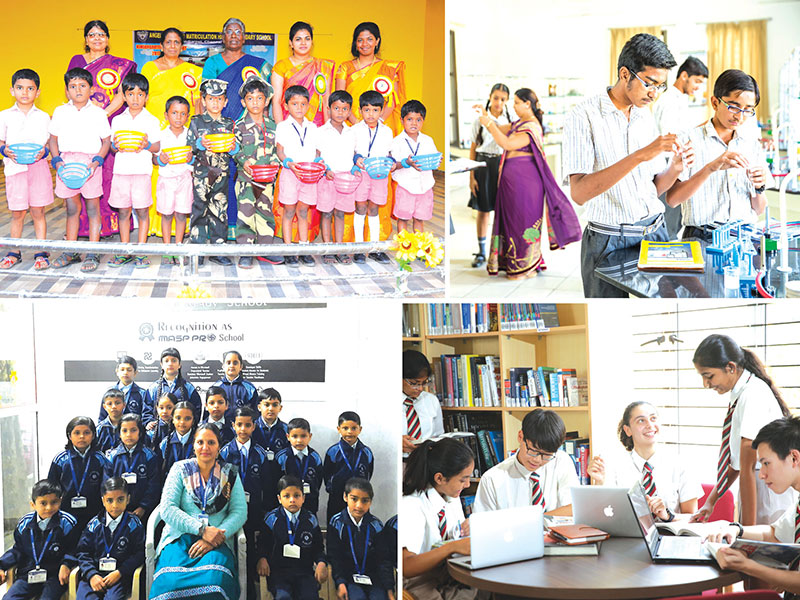Private schools in India report 2020: Brilliant case for the defence
Against the backdrop of pervasive confusion about the character and role of private schools in the national development effort, this detailed unprecedented report demolishes widely disseminated myths of Left liberal academics and shallow media about private K-12 education – Dilip Thakore The new National Education Policy 2020, presented to the nation by Union education minister Dr. Ramesh Pokhriyal ‘Nishank’ and his predecessor Prakash Javadekar on July 29, has received great acclamation from the Left-dominated India academy, and from the right-wing Rashtriya Swayamsevak Sangh (RSS), the ideological mentor organisation of the BJP government at the Centre and in 12 states of the Indian Union. Four years in the making, NEP 2020 which comes after an interregnum of 34 years — the previous National Education Policy was presented to the nation in 1986 (reviewed in 1992) — has achieved this remarkable balancing act by reinforcing the neta-babu (politician bureaucrat/educrat) control and command architecture of post-independence India’s education system. The academy dominated by communists and fellow travelling Left liberals have acclaimed NEP 2020 because it multiplies the number of government policy formulation and regulatory agencies to direct and closely supervise and monitor the country’s pre-primary to PhD education institutions, especially private schools and higher education institutions which are anathema to them. The ideologues of the RSS have silently welcomed the new education policy because comprehensive government control of education clears the way for them to infiltrate the academy and rewrite Indian history proclaiming the glories of pre-Mughal Hindu kings, demonise Muslim rule over the subcontinent during 16-18th centuries, and in the fullness of time, revise the Constitution of India to establish a Hindu rashtra in which the country’s 200 million Muslims will become second class citizens, as Hindus are in neighbouring Pakistan. For this project to succeed, private education institutions have to be strictly monitored and controlled by the State Trapped between politicians and ideologues of the Left and Right singing hosannas of NEP 2020, is India’s educated middle class, including the intelligentsia, liberal academics, the media and educated upper middle class, aka the establishment, which shapes and moulds public opinion. Bombarded by continuous socialist propaganda and private enterprise bashing by freeloading academics and leftist media, India’s expanding middle class is suffering a massive Stockholm syndrome, becoming enamoured with post-independence India’s neta-babu brotherhood which has bound it in irons and chains for over seven decades since the assassination of Mahatma Gandhi by an RSS acolyte in 1948. The outcome of this perverse romance is mass schizophrenia. Although the entire middle class overwhelmingly enrols its children in fees-levying private K-12 schools despite the option of sending them to free-of-charge government schools, it endorses debilitating government control and command over private schools to prevent “commercialisation of education”. Against this backdrop of pervasive confusion about the character and role of private schools in the national development effort, the online release on July 22 of State of the Sector Report — Private Schools in India (hereafter PSIR 2020) — an unprecedented study commissioned and published by the…


















NEP 2020: Disappointing philosophy
– Shiv Visvanathan is director of the Centre for the Study of Knowledge Systems at O.P. Jindal Global University, Sonipat The National Education Policy (NEP) 2020, released on July 29, is being celebrated by many as a great document, the BJP/NDA 2.0 government’s gift to the nation to mark the 74th anniversary of independence. I was looking forward to celebrating it, hoping it would be a continuation of the monumental Radhakrishnan (1948) and Kothari (1967) national education policy reports. But after reading it, I experienced shock, almost unease. It reminded me of the line of questioning the great citizen scientist and energy expert Amulya Reddy used to adopt with his students. Whenever they answered his questions by way of newspaper headlines, Reddy would insist: “Tell me what’s in the third paragraph”. He was aware that there were gaps in the way most students thought. Reddy was quick to spot the gaps between the philosophy and terminology of an idea. Most students don’t understand the culture of the worlds they inhabit. Secondly, their ritual of operationalisation of ideas tends to be skimpy. They usually institutionalise a process instead of a value framework This statement was brilliantly illustrated by a Tibetan monk teaching at MIT, Boston, who observed that when notions of efficiency and instrumentality are introduced in education, schools became joyless places and education a dismal science. NEP 2020 is a testimony to this learned monk’s insight There are two ways of reading the report. One can read it as a shopping list in an education supermarket or read it to understand the philosophy underlying it. When one takes the second option, NEP 2020 is disappointing. Although this makes me a marginal outlier one cannot doff the hat to an exercise of rank illiteracy. NEP 2020 has several basic flaws that need to be highlighted. First, is the idea of childhood. Childhood is an era of dreams, myths and socialisation through play. It’s a period of freedom and anarchy. But to make childhood relevant, the policy treats childhood education as an industrialist, Taylorist, Fordist system. In fact, if one grasps the metaphor, NEP 2020 envisages childhood education as a rocket fired in stages. There’s little awareness of the dreams of Montessori, Tagore or Geddes in this document because it lacks sense of play, the idea of homo ludens (‘playful man’) that the Dutch scholar Johan Huizinga eulogised. Without playfulness and the smell of it, policy instrumentalises education. Moreover, there’s an incompleteness in the development of ideas in the NEP 2020 that needs to be highlighted. First, it confuses freedom with choice. Freedom as a philosophy lets one articulate the framework of choice. In NEP 2020, choice is presented as a fixed questionnaire. This is evident in its prescription for universal literacy and numeracy. Educationists tend to stress that the two terms are not complete without ecolacy (environment awareness). Number and language have to go hand in hand but ecolacy is an absentee concept in the report. As a result, the idea…